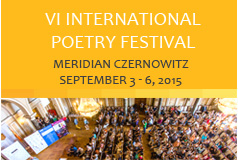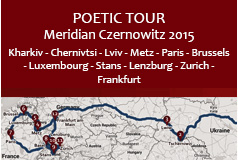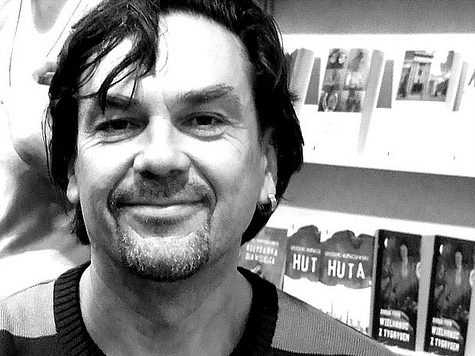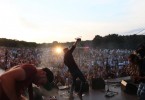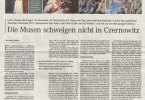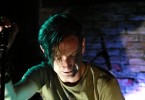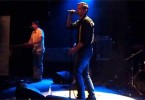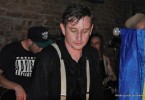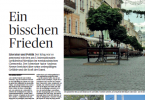Ukraine – an ‘unknown’ country that lies at the margins of Europe. A political football kicked back and forth between Russia and the EU. Yet beyond the politics lies a new, and magical literature; one that revels in dirt and despair, and dares to dream….
In 1991 a country of 48 million souls was created right at the heart of the Eurasian land mass. It stretches from the woody mountains of the Carpathians where peasants still till the earth by hand, through cobblestone towns with medieval castles and Austro-Hungarian opera houses; over the onion domes of monasteries, and endless suburbs of grubby apartment blocks; across a warm sea to the smoking chimneys of Europe’s largest factories, and into its deepest, darkest mines.
The country is Ukraine, but despite its size and sweep it has largely failed to establish a narrative for itself in the world. It is vaguely associated with prostitution, the occasional sports star, politicians who look like nightclub bouncers, and have fist-fights during plenary sessions. But alongside the creation of the body politic something else was also made possible after 1991: a new literature. During the USSR, Ukrainian intellectuals who actively fought for their language were often hounded for their troubles: over 500 Ukrainian authors were shot or imprisoned for nationalism during the Soviet period. Now, Ukrainian is the official state language, and Russian is in the minority. The new Ukrainian literature is desperate to carve out a place for itself in the world and, unlike the politics, it is something to be proud of.
The journey of contemporary Ukrainian literature starts with violent vomiting on a Moscow side street. Otto von F, the hero of Yuri Andrukhovych’s novel The Moscoviad (1993) has been on a binge (beer, champagne, vodka, meths, madeira) during the final days of the Soviet Empire, boozing his way through a psychotic city of monarchist madmen, terrorists and thieves, ranting at the great symbols of Russian might: ‘This is the city of a thousand and one torture chambers. A tall advance bastion of the East, in anticipation of conquering the West. The city of Bolshevik Imperial architecture with the high-rise ghosts of people’s commissariats. It only knows how to devour.’
Otto is a Ukrainian student poet, resident in the dorm of the gigantic, jagged, neo-gothic tooth of Moscow State University, sensing ‘the slow bursting of the Empire’s seams, with countries and peoples crawling apart, each of them now acquiring independent relevance.’ If Ukrainian writers once wrote about the great capital with a mixture of fear and awe, Andrukhovych’s hero drunkenly gobs and waves two fingers at it: his very name, Otto von F, announces his European superiority to the barbarous Russian East. This is a reversal of the prevailing Russian view of the relationship with Ukraine, which categorizes the former as the more civilized.
‘Little Russia’ was how present-day Ukraine was frequently described by Russians, and, in the admiring but patronizing words of Ivan Bunin, Russian writer, and winner of the Nobel Prize in 1933: ‘Little Russia has no history…it has only songs, legends; it is somehow outside of time.’ Ukrainian was considered the language of folklore and the country-side, of illiterate peasants who believed in attractive female vampires living in brooks; of devils hiding in cheeses and magic eggs. Ambitious writers defected to the dominant language: Gogol, for example, wrote his early poetry in Ukrainian, before switching to Russian when he went up to conquer St Petersburg.
But now The Moscoviad trumpets Ukrainian superiority. Otto’s vomiting comes at the climax of the book: ‘You finally pour out of yourself all this Moscow, you erupt irrepressibly, selflessly, joyously.’ This is puking as a cultural and historical act, ejecting the gastric juices of the Russian and Soviet Empire, free now to stumble to the station and catch a stuffy train to his soon-to-be-independent home country.
Home for Andrukhovych is Western Ukraine, the old outer fringes of the Austro-Hungarian Empire that was only ‘deported’ into the USSR after 1939. Before the Holocaust, and the arrival of the Soviets, the towns here spoke several languages: German and Yiddish, Polish and Hungarian as well as Ukrainian. This is the home of the Austro-Hungarian writers Paul Celan, Joseph Roth, and Sader-Masoch (who all wrote in German); the Polish-language genius Bruno Schultz; of the Baal Shem Tov and Hasidism. The centres of Lvov, Czernowitz, Ivano-Frankivsk and Uzhgorod still look like mini-Viennas. In autobiographical essays, Andrukhovych recalls growing up on shabby, elegant art nouveau streets where hunch-backed ancients still dressed like they were going to see the Emperor Franz Joseph. He downed his first teenage drinks and caught his first kisses in the ruins of Austro-Hungarian castles, the very architecture a connection to the world beyond the Iron Curtain. ‘Sometimes we dream of Europe,’ says Otto von F towards the finale of The Moscoviad, ‘at night we come to the banks of the Danube. We seem to recall something: warm seas, marble gates, hot stones, southern vines, lonely towers.’
But when the post-Soviet Ukrainian writer finally finds himself in Europe, all is not straightforward. In Perversion, Andrukhovych’s follow-up novel to The Moscoviad, the hero is again a poet, and sounds much like a version of Otto von F, grown up. He leaves Ukraine and becomes a pan-European adventurer taking on false names, identities, speaking half-a-dozen languages and dying mysteriously in Venice during the Carnival. Rather than finding himself, the Ukrainian writer is submerged, and swallowed up by Europe. In the essay What Language are you From? Andrukhovych remembers a French literary agent advising him that if he wants international success then he should change his unwieldy name to something more European; and write not in marginal Ukrainian but one of the great languages.
‘The Ukrainian choice is the choice between a non-existence and an existence that kills you’ writes Oksana Zabuzhko in Fieldwork in Ukrainian Sex, her debut novel, written in 1996. Despite the stream-of-consciousness prose the novel topped the Ukrainian bestseller charts for over ten years: the first Ukrainian novel to mix violent sex and musings on national philosophy; and written by a fear-nothing female.
The heroine (never named) burns with linguistic patriotism, and a desire to make good the sacrifices of all those tortured and killed Ukrainian poets of former eras; recalling the martyr-hero of Ukrainian poetry, Vasyl Stus, who died in a Soviet labour camp in 1985: ‘My people, it is to you I am returning/ in death I somehow find my fate’, wrote Stus shortly before his death. It is a story and mission that reflects Zabuzhko’s own. In September 2012, I heard Zabuzhko, as well as many other Ukrainian and German, Dutch, Austrian and Swiss poets, read her poetry at ‘Meridian’, a literary festival in Czernowitz, aimed at reconnecting Ukraine with the European cultural world. One of the readings was, somewhat provocatively, at the local open-air market. A dusty, clanging, crowded place where broad-shouldered women in Adidas trainers and vermillion, village shawls sold Chinese furniture, scrap metal, moonshine, live pigs and fake mobile phones. The stage for the poets was set in the centre of the market. When Zabuzhko came on stage she complained of the Russian pop music blaring from loudspeakers: ‘I hope we can switch from Russian pop to Ukrainian poetry now.’
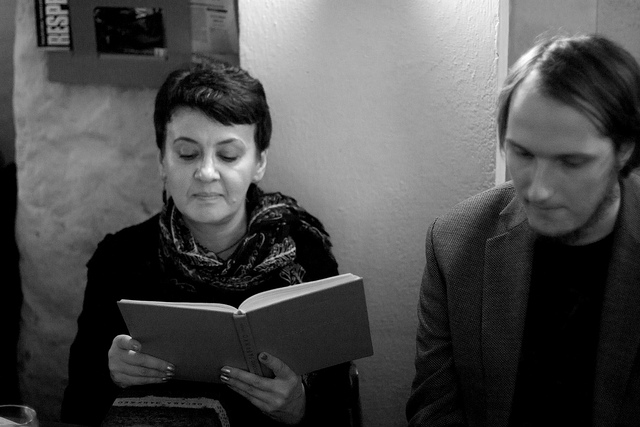
Zabushko began to read: her reading style is like a witch’s incantation, all howls and orgasmic swoons. At first, the local market traders were nonplussed. Poetry? Here? Then they began to listen, munching on sesame seeds, and spitting the shells out. An elderly fruit-seller came up to Zabuzhko and handed her a pail of wild strawberries. I followed the fruit-seller back to her stall: Zabuzhko’s poems of middle-class, urban angst had triggered lyrical memories, and now she was reciting snatches of Ukrainian folk songs and poems: ‘I’d totally forgotten about poetry,’ said the woman, ‘I used to know so much as a child in my village.’
But in Fieldwork Zabuzhko also confesses to a sense of exasperation with her mission. As the heroine travels the world from one international literary seminar to the next, impelled to prove to the world that Ukrainian is a living language, she is exhausted by the need to constantly answer the question ‘Ukraine? Where’s that?’ Even in Kiev, Ukraine’s capital city, the focus is more on Russian rather than Ukrainian culture: its most famous writers, whether Bulgakov in the 20th century or Kurkov in the 21st, write in Russian. When Zabuzhko meets a provincial Ukrainian painter, she suddenly thinks she has discovered her ideal, genuine Ukrainian man, as steeped as she is, in Ukrainian culture, the first man to whom she doesn’t have to explain herself. The heroine is blissful at first, but the relationship quickly becomes physically and psychologically violent, the sex abusive and tortured (you sense the Ukrainian in Sader-Masoch’s writing, after you read Zabuzhko). When the heroine tries to get her Ukrainian lover to advance his career in America he is too hung-up to flourish there. Her body marked by scars and burns, her mind wrecked; the affair with the ‘ideal Ukrainian’ sends the heroine into a nervous breakdown.
‘Why does she put up with it?’ wonder her American friends (of the man but it could as easily be of the country). ‘We were raised by men fucked from all ends every which way’ she answers, ‘later, we screwed the same kind of guys, in both cases they were doing to us what others, the others, had done to them.’ In Fieldwork, the abusive lover becomes a compendium of Ukraine’s historical tragedies: his father spent time first in a Nazi and then a Soviet concentration camp; he was pursued by the KGB. In the 20th century, some 14 million people are estimated to have been killed in Ukraine through a combination of purges, holocausts and enforced famines. When Zabuzhko’s heroine raises the question of having children, the painter spits back: ‘Slaves should not bear children.’
Both Zabuzhko and Andrukhovych were born in 1960, hung out in dissident circles in the late Soviet period, and were in their early thirties in 1991. Their work still contains the germs of a positive national project, their literary mission to find a language to explore Ukraine’s past, and establish its present. Serhiy Zhadan is from a younger generation. Born in 1974, he was just seventeen when the Soviet Union collapsed. Zhadan’s heroes are not tortured poets and intellectuals grappling with the meaning of the country. They are gangsters, corporate slaves, prostitutes and losers. In the poem Lukoil, semi-criminal oil-traders come to drink a toast at the graves of their colleagues:
‘They cry into the their Dolce and Gabbana suits, and drink Hennessy from plastic cups,
‘Here you go Kolya’ they say, ‘here’s your 10 percent cut.
On the infinite fields of off-shore companies we are shot down like wild geese with gun-shot in their livers.
Death is a land where our credit cards don’t work,
Death is a land of black oil that will wash away his sins!’
Zhadan’s stories are full of teenagers and twenty-somethings, the first post-Soviet generation, travelling the country: football hooligans limp back after being knifed at an away game across a landscape of endless rusting train lines; a hash peddler delivers his wares through Yalta, popping into a flop-house full of Tartar families sleeping on the floor, via a mansion where a sect of former prostitutes sing Evangelical songs. The journeys of Zhadan’s heroes stop abruptly with acts of random violence and arrests. This is a generation going God Knows where, and why, crossing the country hither and thither with no purpose.
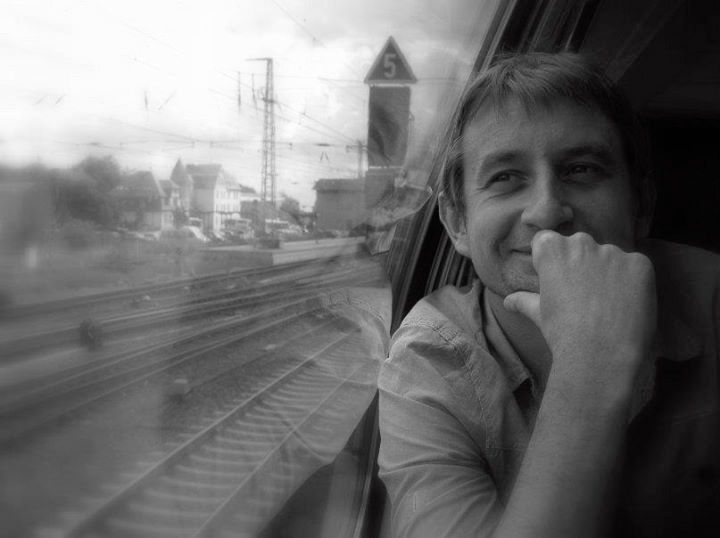
It’s a restless motif that expresses the deep malaise of post-Soviet Ukraine. No leader or movement has been able to construct a forward-looking, positive ideology in the country. Under President Kuchma (1994-2005) the policy (if one can call it that) was to play Russia and the West against each other, not developing anything oneself but rather siphoning off development aid from the West and gas from the East. During the Orange Revolution in 2004, it suddenly seemed as if Ukraine was going to choose a pro-European, western path. But the ‘revolution’ quickly curdled and in 2010 Ukraine elected Viktor Yanukovich as President.
Yanukovich served time for robbery and assault as a teen, speaks poor Ukrainian and demotic Russian, jails political opponents and has alienated both the West and Russia. ‘Where is Ukraine going? What does it want?’ has become the exasperated groan in western capitals. One of Zhadan’s stories is a series of sketches set on the EU-Ukrainian border, with a sad, ragged crew of Ukrainian smugglers and love-sick youths trying desperately, but never quite managing, to make it over the elusive Schengen line. ‘We’re neither here nor there’ says Zabuzhko’s heroine, ‘Europe has managed to infect us with the raging fever of individual desire, faith in our personal “Yes I can”, yet, we never developed a foundation for such faith, those structures that might support that “I can,” and thus we have tussled about for ages at the bottom of history.’
But for all the harsh realism of Zhadan, Zabuzhko and Andrukhovych, all three writers’ work is marked by a distinctly magical strain. In the final paragraphs and verses of Zhadan’s realist stories, often the author’s vision rises up from the street to glimpse something from the beyond: the souls of just-shot hoodlums rising above the tram lines of Kharkhiv; a grim poem about a mass murderer cycling through an industrial town transforming into a vision of demons straight out of the dark forests of Ukrainian folklore. Andrukhovych’s The Moscoviad, as well as his later novels, strains at the leash of realism, and suddenly, towards the end, without noticing the transition, the hero finds himself in a fairy tale nightmare world of giant rats and subterranean palaces. Similarly, the abusive lover in Fieldwork draws paintings full of pagan forces: ‘witches in a wild dance, a rite of Spring;’ a vision of Ukraine seen as the irrational opposite to the measured West, as experienced by the heroine at Harvard.
Contemporary Ukrainian writers, then, are Europe’s grittier Latin Americans, mixing magical realism with domestic abuse, folklore and mafia. And, if you look closer at the great classical writers who were born in Ukraine but wrote in other languages, you find they are likewise marked by a similar surreal tradition: Gogol, writing in Russian, introduced Ukrainian folklore into Russian literature, first through his Dikanka Tales, with their demons helping lads seduce pretty girls in haunted barns; and then in a more distant echo, with his Petersburg Tales where the ghosts of bureaucrats haunt the Imperial capital. Ukrainian folklore transformed Judaism, populating Hasidic tales with genies and flying rabbis. The Israeli classic Aahron Appelfeld, raised in Czernowitz and educated in German, remembers nannies and servants singing and telling tales to him in Ukrainian. Maybe, via the nannies and the servants, Ukrainian folklore found its way into the hallucinatory visions of Bulgakov’s talking cats and devils strolling around Communist Moscow; into Joseph Roths’s hotel ceilings melting into transparency, as if it is the most ordinary thing in the world.
Rather than something marginal, the Ukrainian sense of a living folklore, where the fantastical is seamlessly included in the every day, has been secretly transforming the mainstream of European literature for centuries. Old Ukraine is today finding a new voice: ‘The most interesting things’, writes Andrukhovych, ‘are happening at the margins.’



